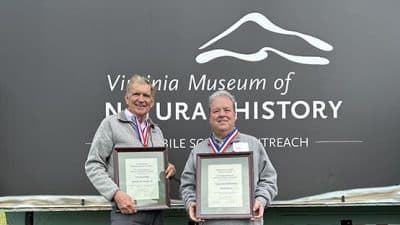Column by Jim Bishop
Submit guest columns and letters: [email protected]

Patchwork Pantry, located at Community Mennonite Church at the corner of South High and Water streets in Harrisonburg, was Sheri’s brainchild, started in 1992 after she and husband Jay spent a year in Voluntary Service in Indianapolis, Ind., where a food pantry program operated.
The program has been an ecumenical effort from the start, today supported by six local churches and businesspersons and administered by a nine-member board of directors.
Currently, Patchwork distributes approximately one thousand pounds of food to local people every week, with an upswing in traffic expected as Christmas approaches. Much of the food comes from the Blue Ridge Area Food Bank in Verona, supplemented by donated items from congregations and individuals.
Sheri offered some rather impressive statistics on the program: From May through September this year, 452 volunteers worked 865 hours to give food to 1,132 households. Of the 4,286 individuals who received food, 182 were over age 65 and 1, 979 were children under 18 years of age. The average number of households coming to the pantry each week was 56; the highest number in one evening was 71, the lowest, 33. Weather is a factor in the turnout, Sheri noted.
“More food pantries have opened in the central Valley area, which makes some assume that has lowered the number of individuals and families we serve,” Sheri noted. “But, that’s not the case.
“What continues to surprise me is that roughly half the people who show up at Patchwork Pantry have no income, period,” she said. “I think the fact that we operate the same time every week – 7-8 p.m. Wednesdays – helps persons to know when and how often to come.”
Even though a well-oiled system keeps things moving on Wednesday nights, the numbers of people who show up means there are lines, and with lines come some waiting.
Many children accompany the adults on Wednesday nights, and little active bodies have problems sitting patiently. A recent development is helping to remedy this situation, called “Patchwork Kids.”
Joyce Peachy Lind of Community Mennonite Church organizes a rotation of churches on a monthly basis for the “Patchwork Kids” program. Volunteers play games or lead crafts activities with the youngsters while parents are being interviewed and receiving foodstuffs.
Surprisingly, Patchwork Pantry doesn’t need money at the moment. What is needed, according to Sheri, are “additional volunteers, especially during the summer months when many students are gone” and certain donated items.
Specifically, Patchwork could use more canned fruit, eggs, cheese and fresh produce as well as more [non-food] items such as laundry detergent, toilet paper, soap, diapers, toothpaste and tissues.
Sheri is quick to credit others for the efficient operations that typify Patchwork.
“No doubt about it – were it not for the dedicated volunteers that assist every week and do many other tasks behind the scenes, none of this would be possible,” Sheri insisted.
She is reluctant to cite individuals but expressed gratitude for the 3-4 men who go to Verona every week to pick up non-perishable food from the Blue Ridge Area Food Bank. In addition, James Madison University’s Center for Service Learning provides 12 volunteers each semester, and students from the social work program at Eastern Mennonite University are regular volunteers.
Volunteer Alex deHavilland of Harrisonburg is among the many enthusiastic Patchwork volunteers.
She first volunteered as a way to practice speaking Spanish while in graduate school in public health education at James Madison University. She showed up every week and has done just about every job that Patchwork offers, often interviewing clients.
“An interview usually takes about 10 minutes but in that short time you get to know someone, can share a laugh or a story and end up encouraging those who feel dejected and depressed about not being able to provide for themselves or their families,” deHavilland said. “I try to make sure their first visit is a good experience and tell them it’s okay to receive food from the Pantry.”
DeHavilland is a medical case manager for the Valley AIDS Network, which makes her familiar with many of the services Pantry clients may need and is able to make referrals to agencies and needed services.
“Patchwork Pantry has done a great job keeping up with the increased demand for food in this difficult economy,” she said, adding: “It gives me great joy to know that at the end of every Wednesday I’ve been able to help someone is a real, immediate and lasting way.”
In reflecting on Patchwork’s development, Sheri said, “I realize how fortunate we were to have wise counsel in setting up this program,” Sheri stated. “Over the years, we’ve made few major changes in our organizational and operational patterns.
“We’ve never aspired to become another social service agency in town,” she said. “Our mission is to help people in the community who have a basic need, to listen to them if they want to talk and to show the love of Christ.”
That’s some food for thought.











